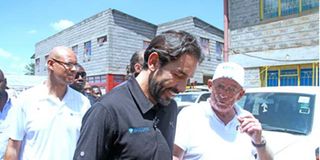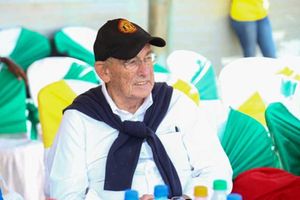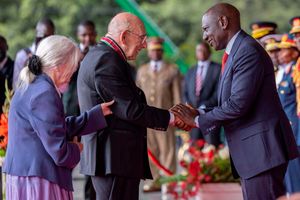
Bob Munro (right) receives Arsenal legend Robert Pires at MYSA head office on December 5, 2015.
Bob Munro lived for football, worked for football and helped professionalise the Kenyan top league.
A stickler for transparency and accountability, Munro helped transform the Kenyan Premier League.
His love for sports and association with the youth saw him form Mathare Youth Sports Association (MYSA).
A large percentage of Kenyan footballers have passed through MYSA, the largest football development programme in Kenya and East Africa- it illuminated the face of Bob Munro.
He touched the lives of many Kenyan footballers who would otherwise have engaged in social vices. He succeeded in taking many off the streets, mentored them through MYSA and offered them a means to live a gainful life through sports.
From Francis Kimanzi, the interim Harambee Stars coach, to Denis Oliech-arguably Kenya’s most lethal striker in the modern era, MYSA, thanks to Munro, created a conveyor belt for talented footballers in the country.
Munro’s journey in Kenya began in 1987 when he, alongside his wife, Ingrid, moved to Nairobi. Moved by the challenges faced by children in the Mathare slums, Munro established MYSA as a means of empowering youth and promoting community development through sport.
The organisation grew to become a model for youth development touching the lives of countless young Kenyans.
Munro’s significant contributions extended beyond grassroots football.
He played a vital role in the professionalism of the Kenyan Premier League, earning the title of the “Father of the KPL”.
His vision and leadership helped shape the future of football in Kenya at both the grassroots and professional levels.
But it was never an easy ride for Munro in his efforts to bring in professionalism to the game.
He brushed the (football) federation officials the wrong way severally, was branded a foreigner interfering in the running of Kenya, and at some point was nearly deported.
In 2006, the then sports minister Maina Kamanda threatened to have Munro deported.
Munro was picked up by six immigration officers and two police men who took him to a meeting with the Principal Immigration Officer to discuss his work permit.
Munro held an ‘A’ class work permit, but the Department of Immigration insisted that this had been issued by a mistake, meaning he had to apply for an ‘H’ class permit that applies to investors. He was given two weeks to obtain a new permit or face deportation.
Munro, who arrived in Kenya with Ingrid in 1985, said convincing her to relocate here was one of his best ever decisions.
He worked as a senior adviser on environmental policy, water resources management and sustainable development for African governments, regional development organisations and the United Nations.
His involvement in football started in 1987 when he founded the Mathare Youth Sports Association- a self-help youth sports and community development project in one of Africa’s largest and poorest slums.
Today, over 15,000 youth on 1,200 teams take part in the MYSA sports, slum clean-up, AIDS prevention, leadership training, jailed kids, photography, music and other community development activities.
Another 10,000 youth from eight countries participate in a similar sport and development project initiated by MYSA in 1999 in the Kakuma refugee camp in north-west Kenya.
It is from MYSA that Mathare United was born, opening the door for Munro’s affair with Kenyan football.
Mathare United won the Moi Golden Cup in 1998 while still in the lower division, before being promoted a year later and winning the Kenyan Premier League title in 2008.
But it is from 2000 that Munro became a key player in Kenyan football politics. He was liked and hated in equal measure.
Federation officials loathed him, while clubs looked at him as the champion for professionalism in football management.
He took on federation officials without fear, documenting financial mismanagement in the football body and reporting to Fifa.
His consistent pressure saw Kenya suspended by Fifa, which in turn made him a marked man.
In 2006, Kamanda appointed a committee to probe Munro’s conduct and any contribution that might have led to Kenya's suspension from international football.
The committee had Re-Union chairman Mark Ageng (now deceased) Kenya National Sports Council (KNSC) vice chairman Nderitu Gikaria, National Olympic Committee of Kenya's Njeri Onyango and AFC Leopards’ Peter Lisamula.
”Bob Munro has done nothing for community clubs. He has a good chance of sourcing for money for other community clubs, but instead he has got the country banned by FIFA,” Kamanda told reporters at the time.
During that period, top clubs had decamped from the federation as they pushed for their autonomy. Munro was the ringleader of the Inter Club Consultative Group (ICCG) a grouping of elite clubs in the top flight league, which morphed into the Kenyan Premier League.
“He had a vision for the league and would spend most of his time helping source corporate and financial support for the league,” says Gor Mahia chairman Ambrose Rachier.
“It is because of the professionalism that we adopted in the running of the league that we managed to get Supersport as the broadcast sponsors of the league,” he adds.
Sam Nyamweya, the former FKF president, says Munro’s vision helped the KPL grow to become one of the best in the region.
“Sadly, the recent FKF administration killed his (Munro’s) baby (KPL) and you can see how our league has retrogressed, “ added Nyamweya.
Nyamweya says Munro’s push for professionalism in the running of the league and football in general was misunderstood.
“Some thought he wanted to take over the running of the game, but after working with him during the formation of KPL, I realised he meant well for Kenyan football.
Those who were uncomfortable with Munro said he wielded so much influence in diplomatic, corporate and grassroots circles, which left federation luminaries exposed. He was said to be so close to the FIFA top-brass.
In the latter years, Munro took a backseat from local football. His waning health also impacted on his club Mathare United, which was relegated (though it has made it back to the top flight). MYSA, which enjoyed funding from international organisations, is short of money to sustain its projects and his project seems to be slowly dying.
Last month, Munro was awarded the Elder of the Order of the Burning Spear (EBS) by President William Ruto during Kenya’s 60th Jamhuri Day celebrations.
This prestigious honour was one of many accolades he received during his lifetime, including the Help for Self-Help Prize (Oslo, 1999) and the Play the Game Award (Aarhus, 2015). On Sunday, January 19, Munro breathed his last. President Ruto mourned Munro, describing him as a pillar of sports in Kenya and a firm believer in youth development.
“Bob Munro was a pillar of our sports and a firm believer in youth development. His drive to make football thrive in Kenya was extraordinary; Bob expertly spotted and nurtured talents, and brought sanity in the game,” said Ruto.
Former Mathare United player and KPL Chief Executive Officer, Jack Oguda, termed Munro as a true legend and a father figure.
“I had the privilege of donning the jersey of Bentoz playing in MYSA the best organised grassroots league in Kenya and Mathare United FC. In 1994 we managed to convince Bob to form our team to play in the KFF league of which he did as he could see the talent and as the future was bright,” said Oguda.
“We made significant reforms that professionalised the game, ensuring transparency, accountability, and integrity in football administration.” Oguda added.









